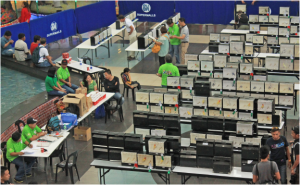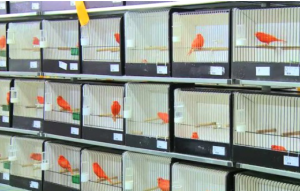Etiquette for beginners and aficionados alike.
The desire to see beautiful birds can bring anyone to a bird show. Bird hobbyists, enthusiasts, and bird lovers can bring their birds and join the competition so that their trophies can do the talking. Those without birds that can be entered into the competition or who are looking to enter the bird hobby or who are just plain curious are all welcome; they can watch the judging and view fine bird specimens for free, and gain additional knowledge in bird keeping. Perhaps they might even be in the show next time.

Bird shows are held almost all year round, organized by different bird groups. Their most obvious objective is to exhibit the best and most beautiful birds of particular species, such as parakeets, budgerigars, African lovebirds, and cockatiels. These are the breeders have bred and groomed for the competition, and they can draw interest from visitors, encourage new enthusiasts to join the hobby. These newbies can also meet most of the reputable breeders in the industry; it is from them that one can acquire birds. The most awaited bird show is that of the World Budgerigar Organisation (WBO) Competition, held annually. Winners of the show are acknowledged and accredited internationally.
At a bird show, the show area is cordoned off. Only the judges and show stewards are allowed inside. This is so that the distracted; they can roam about freely while judging the birds. This also helps prevent them from hearing the conversations of the people around them so that their judging will not be influenced by these comments. Exhibitors, guests, visitors, and other members of the audience, on the other hand, can stay and observe while staying behind the cordon.
There are several parts to a bird show. The first involves the registration of the birds being entered by exhibitors. Second comes the judging of the entered birds; it is at this stage that no one, except for the judges and stewards, is allowed inside the cordoned-off area. The third is the public viewing, when all visitors can come up close to the entered birds to view them. Finally comes the awarding of winners.

For an event to be a great success, judges will not to be exhibitors, visitors, guests, and all members of the audience must be aware of the following:
1. Enter and leave the room only when the birds are being changed. Nobody—not even the exhibitors—is allowed inside the showroom area save for the judges and stewards. This is to lessen distractions and avoid stressing the birds. Exhibitors will generally only be called to change birds should problems arise.
2. It is important to keep the identity of the birds in the show cages confidential. This is necessary to ensure fairness in judging. The birds are what matter most in judging, and not the owner or breeder.
3. As a new bird enters the room, and during judging, avoid talking, making distracting movements, or rustling papers. Birds must not be startled while they are inside their show cages for their feathers could get distorted; they may also get stressed out. Judging may take hours and birds must be in their best stance when the judges are in front of the birds.
4. Do not interact with the judges in any fashion. Ideally, the judges should not know who are present. If the judge chooses to interact with the audience, take part in an unbiased manner. An interaction with a judge can be merely a conversation or by you pointing at something and/or making eye contact. Again, the reason for this is to guarantee fairness in judging. And if a judge chooses to interact with you, try to do so in a way that won’t offend them.

5. Positive or negative comments concerning the judging are discouraged. Good sportsmanship dictates acceptance of the judges’ decisions that are made in good faith. In case there are any complaints and objections to the results of a competition, the complaint must be submitted in writing to the secretariat as the judges’ decision is final. Chosen judges are highly qualified and respectable individuals who passed thorough training to uphold their credentials.
6. Direct any questions or concerns to the Show Secretary. The stewards will be happy to show you to the secretary. The Board of Directors will review your written comments concerning show procedures after the show.
7. Help the stewards and other volunteers if asked to do so. Whether you are an exhibitor, a visitor, a guest, or an ordinary audience member, if asked for help, please lend a hand.
8. Do not make criticisms or any other declarations on entries while inside the bird room or judging room. Do not praise nor comment on them in such a loud voice that the judges might hear you and be unconsciously influenced by your words. Let’s not distract the judging of the chosen judges.
9. Be a good sport. Be part of the solution, not a part of a problem. Remember, the birds are being judged, not the breeders. If your bet or the bird you entered didn’t make it to the top, take it lightly and look forward to the next show.
10. Have fun, relax, and enjoy the show. At a show, many reputable breeders are present. Bird enthusiasts, bird lovers, and beginners can go around and meet these people. Mingle and be friendly; build camaraderie. Have fun while discussing the birds you’re interested in with your newfound friends. Relax, observe birds being judged, and when it’s time for the public viewing, get close to the exhibited birds.
11. If you are an exhibitor, be sure to come early to register. If you intend to learn more and meet the breeders, just be friendly and go meet them while the birds are being judged. If your objective is just to view the birds, you can be around during the public viewing time. Another show is coming soon. See you!
This appeared as “Bird Show Behavior” in Animal Scene’s April 2016 issue.






